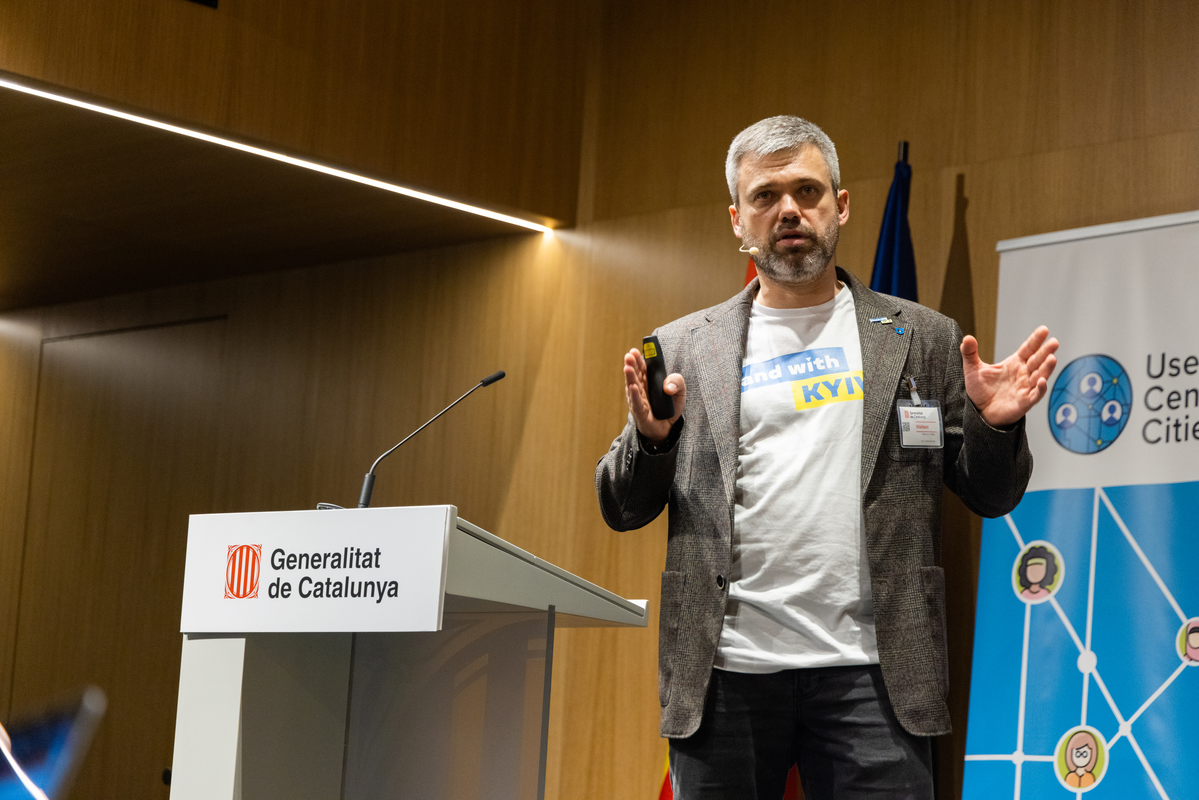
Kyiv’s example of resilience and courage has been under the public eye for the whole year. The government has relentlessly kept operating and delivering services to its citizens in an unprecedented situation, helping them and saving their lives. Adaptation, efficiency and trust are the key words that made the city the modern symbol of resistance.
Convening in Barcelona in the margins of the Smart City Expo World Congress, the world’s leading gathering for cities, and hosted by the Lisbon Council and Generalitat de Catalunya, The 2022 UserCentriCities Summit featured city chief information officers, digital government experts and policymakers to share experiences, analyse evidence and brainstorm together at the cutting edge of digital government and the crucial role of cities and regions. Keynoted by Petro Olenych, deputy mayor and chief digital transformation officer in Kyiv and joined by a panel of remarkable experts Núria Espuny i Salvadó, director-general, digital administration and organisation in the Catalonia Region; Tomas Lehtinen, head of data in Helsinki; and Oleg Polovynko, chief information officer of Kyiv discussed how governments are increasingly relying on digital technologies to provide proactive assistance to residents, particularly those who are most in need, as well as to make services more accessible and responsive.
Since the war started, Kyiv Digital has adapted and included its services allowing citizens to access government services that ultimately help to save thousands of lives. Some examples are air raid alerts, humanitarian aid, housing and public utilities. The main goal is to provide citizens access to trustworthy information, avoiding mass panic. For example, when an attack is occurring, the app provides real-time information about what is happening, followed by instructions on where citizens can go for protection and how to behave in these situations. All this information is updated daily to provide the most accurate information possible. To this date, Kyiv Digital has accumulated two million users, accounting for almost all of the city’s adult population. In the words of Olenych, “Kyiv Digital City is a cornerstone of critical national infrastructure and trusted scale proposition for the country.” Oleg Polovynko, chief Information officer of Kyiv complemented the presentation by recommending attendees to anticipate citizen’s needs and test services beforehand to help manage a crisis and save lives, not only in times of war but with natural disasters events or other drastic situations: “If you start early, you save lives in the future.”
The Summit also had the participation of Núria Espuny i Salvadò, director-general for digital transformation and organisation in the Catalan Government, who introduced Catalonia’s progress in delivering proactive services and its journey to transforming its administration. Espuny I Salvadó highlighted how this journey it’s not solely about digital transformation, but an overall transformation, because “the key point of this is not technology, but change. Change in how we deliver services, change on how we use data and changing how we think.” The main goal is to change the mindset inside their organisation and all public administration.
The Summit closed with the intervention of Thomas Lehtinen, head of data of Helsinki, who presented Helsinki’s transformation from a reactive to a proactive city on citizen’s terms. Finnish law required cities to provide 535 mandatory services, and in addition, Helsinki provides 200-300 extra services, ranging from healthcare to rule enforcement and inspections. Some of these services have been gathering data for almost 30 years, making Helsinki a pioneer in proactive service delivery.“ Data provides more value when it is utilised, on the other hand, the data that is collected with great effort but remains unused is the most expensive kind of data,” pointed out Lehtinen.
The discussion was informed by a new eight-steps roadmap on how to enable a more proactive public-service provision. Help Where It’s Most Needed: How Leading Administrations are Using ‘Proactive Public-Service Delivery’ to Aid Citizens draws on a wide-ranging literature review, a series of high-level workshops and case studies of advanced public-service delivery in Helsinki, Catalonia and Portugal.
Watch The 2022 UserCentriCities Summit in full
Download Petro Olenych Presentation
Download Núria Espuny i Salvadó Presentation